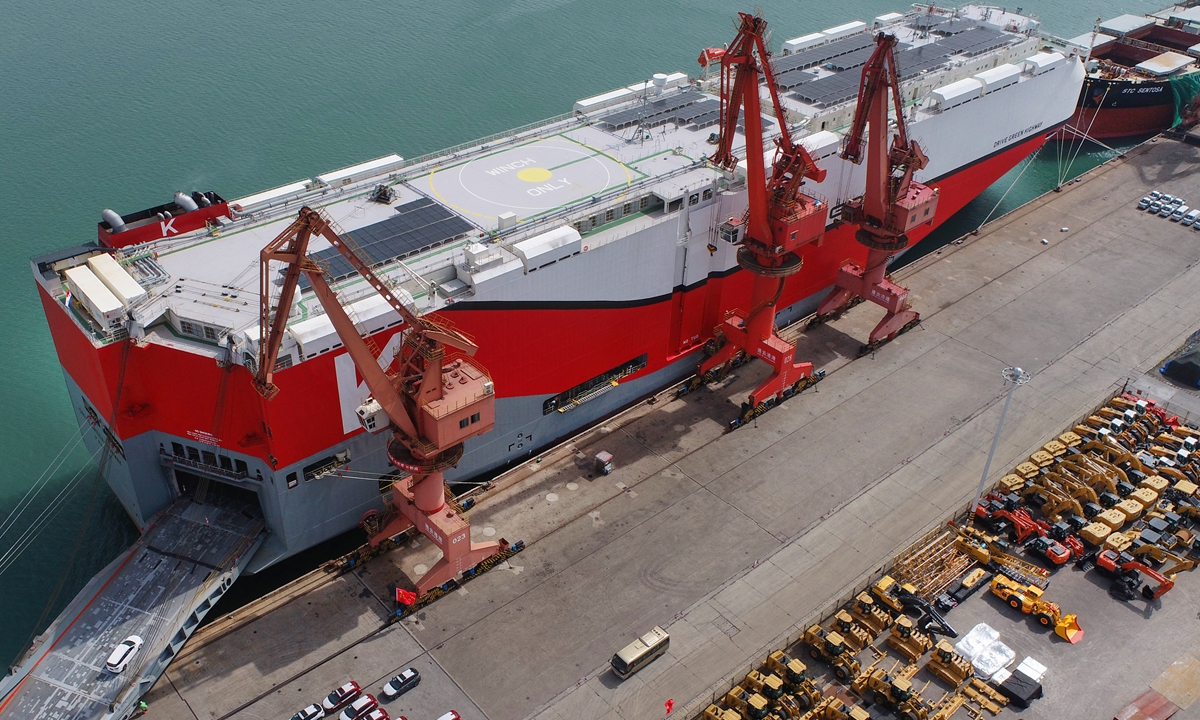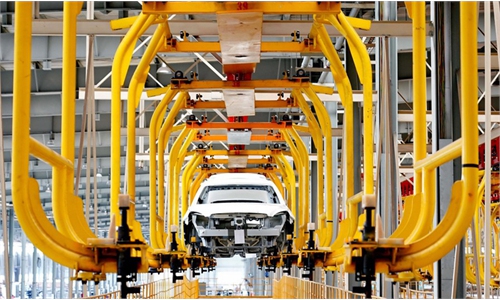
3,053 units of domestically made vehicles are ready to be exported from Lianyungang port, East China's Jiangsu Province on Thursday, a record high for a single vehicle export volume. After the batch of cars is loaded, they will be exported to Mexico and Australia by sea. Photo: cnsphoto
The chip supply shortage that has been roiling the global auto sector seems to have provided an opportunity for exports of domestic-branded vehicles to grow, thanks to their flexible sourcing ability and stable supply chains, a senior analyst told the Global Times.
China Passenger Car Association (CPCA) data showed that China exported about 760,000 cars in the first five months of the year, up 103 percent year-on-year. The main export destinations included Chile, Saudi Arabia, Russia and Australia.
New-energy vehicle (NEV) exports surged, mainly to Western Europe. In May, exports stood at almost 20,000 units, driven by Tesla's exports from its Gigafactory in Shanghai.
Tesla' Shanghai factory shipped 11,500 Model 3 and Model Y vehicles to overseas markets in May, compared with 14,000 in April.
The auto chip shortage, which began late last year, has affected global carmakers' production. But thanks to Chinese vehicle producers' flexibility and sourcing ability, they suffered much less than their counterparts in the US or Europe, Cui Dongshu, secretary general of the CPCA, told the Global Times on Thursday.
Chip shortages forced US carmakers like General Motors and Ford to cut production at their North American factories in April.
"Unlike foreign auto firms or joint ventures, domestic auto firms directly source from auto chip producers to guarantee local production. Their foreign rivals buy chips from tier-1 suppliers," Cui said.
Domestic auto brands could seize the opportunity to export more, he noted.
State-owned SAIC exported 2,430 NEVs in May, while JAC Motors shipped 549.
NEV start-ups like Nio and Xpeng are expanding in Europe. In May, Nio - considered a strong competitor to Tesla - announced plans to sell cars in Norway, its first overseas destination. Xpeng started delivery of its G3 smart electric sport utility vehicles to Norway at the end of last year.
China shipped about 222,900 units of NEVs last year, down 12.5 percent year-on-year.
Cui said that China's car exports would remain robust at least until September, when the global chip shortage is expected to ease.
Xu Haidong, assistant secretary of the China Association of Automobile Manufacturers, said that the impact of the chip shortage is transitory. It's likely to reduce vehicle sales by no more than 10 percent in the first half of the year. The chip shortage is expected to ease during the second half of 2021, said Xu.
"The overseas market has developed better than expected. Exports of Chinese-made NEVs still have large room to grow. It is expected that there will be an increase of 100,000 NEVs this year," Cui said.
In 2020, electric vehicles sales in Europe more than doubled as manufacturers rushed to meet new emissions standards. One in every nine new cars sold in Europe last year was an electric or plug-in hybrid vehicle, the European Environment Agency said.


